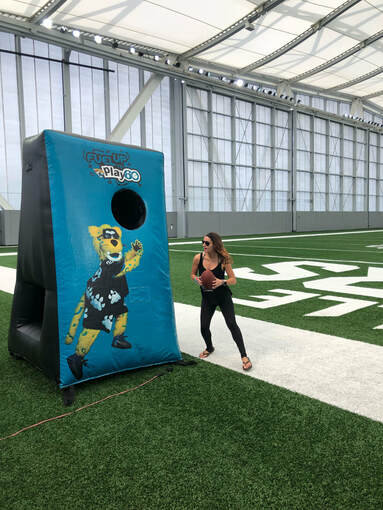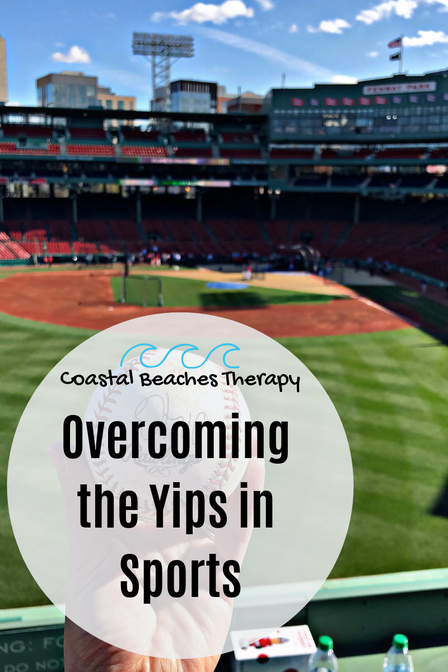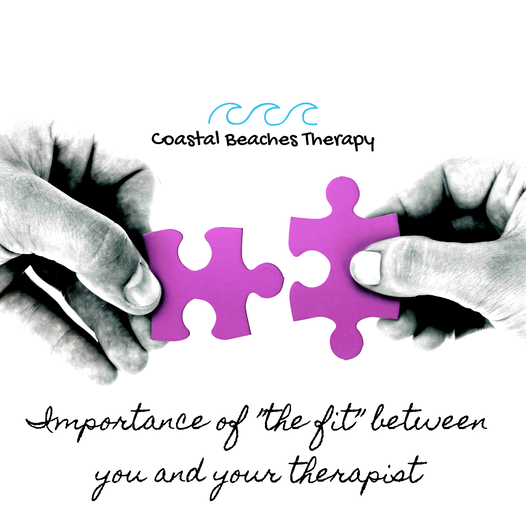What are the Yips?The yips are technically defined as sudden motor skill failure. A perfectly executed pitch is necessary to strike out the opponent at bat; a football kicked in between the goal posts can be the game winning goal; or a single short putt is necessary to win the tournament. Suddenly the athlete's hands or feet cramp up, and the shot or pitch goes wide. There is no clear explanation as to why pro athletes become inflicted by the yips, but studies suggest the yips are due to abnormalities in the electrochemical dialogue that occurs between neurotransmitters in the brain.
From a mental health perspective, overthinking appears to intensify the yips. In other words, concentrating too much may overshadow other important areas in the brain activated during sport, such as balance and timing. From my experience, athletes have a unique responsibility to compartmentalize on and off the field. With this in mind, sometimes the mental real estate being occupied and compartmentalized become overwhelmed. Thoughts, stressors, traumas, and underlying mental health issues such as anxiety, obsessive compulsive disorder, and post-traumatic stress disorder begin colluding with the areas of the brain that are focused specifically on sport performance. In my professional opinion, this is where I have found to be the sweet spot where athletes will get in his or her own way of performing a skill. From my experience working with many athletes who have struggled with the yips, it is my professional opinion that athletes are not all doomed the first time they feel like they are experiencing this level of sport anxiety. I encourage coaches, athletes, and sports personnel alike to talk about the yips and mental health. Working with a mental health professional, or coach for the brain and body can greatly help athletes address the underlying issues causing the yips so he or she can get back in the game. Signs and symptoms of the Yips: -Physically responding in sport with jerking movements or freezing on a skill that was previously easy to execute -Muscles feel tight or sore, interfering with ability to complete a skill -Anxiety, tension, and feeling overwhelmed about completing a skill or task -Performance anxiety about what others will think -Repetitive and intrusive thoughts about the outcome of a skill and/or incompletion Most frequently, the first line of defense is to search for quick fixes, promising lasting results with high rate of failure and relapse. Welcome to a new week! I want to briefly revisit a really cool moment I had this past weekend. The way the sky transformed during sunset on Saturday evening reminded me of something super important: without darkness, you really can't appreciate the light. Try and repeat the words in the sentence out loud:
Without darkness, you really can't appreciate the light. If you notice the contrast between the two images below, you can really observe how the colors in the sky become even more vivid as the sky begins to darken. With this being said, we all experience dark moments in our unique lives. As a therapist, I generally notice the most significant pain my clients have endured stems from a moment in time he or she lost hope. Instead of taking a "what is wrong with you?" approach, I specifically become curious to learn "what is strong in you?". THAT right there is the source of light. If a client can give himself or herself permission to touch the wound and go towards the darkness just for one moment, he or she can truly begin the healing process. Gradually clients can then begin to understand his or her story with greater compassion and appreciate just how strong he or she truly is. SPOILER ALERT: therapy doesn't "make" someone stronger. Good therapy empowers a person to become self-aware and recognize that he or she already has tremendous strength. This is a personal thing that I do as a therapist and each therapist has his or her own style of conducting therapy: I frequently check in with my clients and evaluate the progress he or she is making in therapy. Checking in during the thick of the therapeutic process is critical in not only ensuring that a client and therapist are on the same page but to also offer a moment to pause in therapy and celebrate progress the client has made since the first session. No matter the speed or direction, progress is continuous movement towards a desired goal. Shift happens. Last Saturday I was so fortunate to take part in a Pure Barre class at the Jacksonville Jaguars Flex Field. The class was led by the owners of the Jacksonville and Ponte Vedra Beach Pure Barre studios and the field was packed! Pure Barre among other activities such as looking for shark teeth, surfing, are just some of the ways I nourish my own wellness. When I am well, I am able to connect with my clients, be more attentive and creative in my work. In taking time to prioritize my own wellness, I am able to be authentic and nurture my razor-sharp ability to attune to the needs of my clients.  Wellness is one of the critical factors in being a mental health care provider. Wellness is especially important because mental health providers are one of the primary instruments in their own work. I feel it is incredibly important to walk the talk when it comes to offering a model of wellness or self care for clients. There are a variety of existing methods already in place to improve self-care. However, self-awareness is the first step to identify and configure a formula that will work best to create homeostasis between work, play, giving and receiving, accomplishing tasks, and doing absolutely nothing. The key to ongoing and lasting change is to pay attention to you and your body. Whatever profession you are in, the work itself can get in the way of your own wellness. And although you may be full of wellness tips for others, knowledge doesn't always translate into action for yourself. Awareness is the catalyst to change and if you can give yourself permission to change one thing, start small. Perhaps you will decide to change routine on your way home from work by practicing sets of deep breathing at each red light. Or take a moment to go outside just to feel the warmth of your sun on your skin during a bathroom break. How do you incorporate wellness into your routine? Share by leaving a comment below! Connection between client and therapist is so important, if not the MOST important factor in any type of helping relationship. And like meeting new friends or dating, you aren't going to click with everyone and that is okay!
I feel that one of the best things about therapy is the abundance of therapists out there, and if you decide a therapist isn't a good match for you, then you don't need to go back! Of course, if you make the decision to find a new therapist, I encourage letting the existing therapist know. He or she may offer a session at no cost to you where he or she can offer a termination session. Termination is a gradual and completely NORMAL process of therapy and technically begins the first session of therapy. Your therapist should support this concept in treatment. So where to begin? Please keep these things in mind when searching for a therapist you will vibe with:
|
AuthorAmy Pope-Latham, LCSW is a board certified mental health professional in Ponte Vedra Beach, FL. Archives
December 2022
Categories
All
|






 RSS Feed
RSS Feed